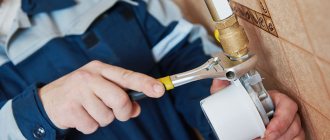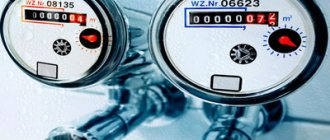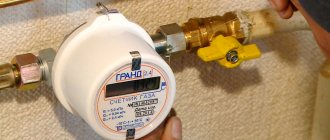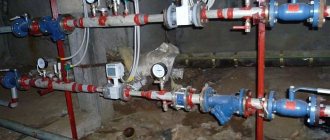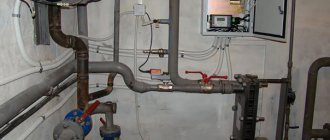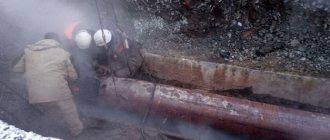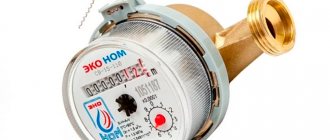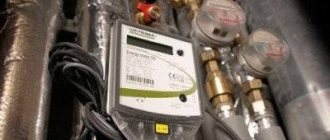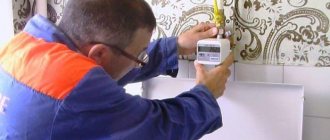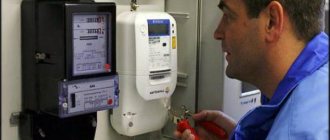Are water meters required in apartments?
In 2009, Federal Law No. 261-FZ was adopted, which provided for the obligation of residential property owners to install monitoring devices for consumed utility resources. Further clarification was given in Government Resolution No. 354, which supplemented the existing law. However, the implementation of the law was constantly postponed, and its final implementation began only in 2015.
As a general rule, installation of devices is carried out at the expense of the owner of the residential premises. To do this, he must contact the management company or other authorized organization and leave an application.
In some regions, benefits are provided for social segments of the population.
The adopted law does not contain any liability measures for citizens who do not install metering devices within the established time frame. For this reason, not all owners installed devices, but only 70% of the total.
Despite the absence of coercive measures and any sanctions, since 2015, new rules for drawing up payment documents for owners who have not installed control devices have been introduced. Bills are generated according to standards along with an increasing factor, regardless of actual water consumption.
This rule does not apply in cases where installation of the device is impossible for technical reasons beyond the control of the owner of the residential premises.
Thus, it is clear to answer the question “is it necessary to install a water meter?” difficult, since direct legal liability for their absence is not provided, there are only standards with increasing coefficients. The decision to install should be made based on the circumstances of a particular situation and the monthly volume of water consumption. For most residential property owners, this decision will be justified, since the size of monthly utility bills will be significantly reduced.
In what cases is it not technically possible to install a water meter?
You need to know that you cannot independently determine the presence or absence of the technical ability to install a water meter; this issue is regulated by Order No. 627 of the Ministry of Regional Development of the Russian Federation dated December 29, 2011. This document clearly outlines all the criteria, the presence of which allows us to make a decision about the lack of technical feasibility for installing a water meter.
So, an individual or communal water meter cannot be installed if:
- utility networks are in a worn-out condition and require major repairs;
- utility networks are missing or require modernization;
- there are no conditions for compliance with the standards defined by the Law of the Russian Federation “On Ensuring the Uniformity of Measurements”, namely: compliance with the rules for installation and location of the water meter, as well as compliance with metrological and other standards necessary for its operation;
- there is a source of magnetic interference, and its elimination is not possible;
- there is no access to the metering device for readings, repairs and maintenance;
- it is impossible to provide the required temperature conditions for operating the water meter;
- high humidity is recorded or the room is periodically subject to flooding.
ORDER A SERVICE FROM ACCREDITED COMPANIES
All these reasons are objective and allow the consumer to exercise their right not to install a water meter. However, if, for example, a renovation was carried out in the house, as a result of which the water supply pipes were hidden behind plasterboard structures, embedded in the floor screed, etc., a conclusion about the lack of technical feasibility for installing a water meter will not be issued, since such an engineering solution is the consumer's own initiative.
It is important to note that when making a decision on the presence or absence of the technical ability to install a water meter, they proceed, first of all, from the state of the house’s utility networks, but in some cases the technical condition of the house is also taken into account, including the fact that it is classified as an emergency fund.
Are water meters required in old houses?
These regulatory legal acts stipulate that control devices must be installed in all residential premises.
However there are exceptions:
- the building in which the apartment is located is recognized as unsafe;
- the pipeline system requires major repairs;
- other technical features that prevent the meter from standing and correctly determining consumption volumes.
Any of the above circumstances must be recorded in writing. In this case, payment is made according to the standards without increasing factors.
When making calculations, RSO has the right to apply increasing coefficients in the absence of ODPU
In accordance with paragraphs. 21 (1), 30 of the Decree of the Government of the Russian Federation dated February 14, 2012 No. 124, RSO determines the amount of resource supplied to the management organization for the purpose of maintaining the common property of an apartment building, taking into account the presence or absence of ODPU and the technical ability to install it.
So, according to paragraphs. “c” clause 21(1) of the RF PP No. 124, if a house does not have a common metering device installed and there is no act that would confirm the inability to install an ODPU, then in 2021 the RSO has the right to apply an increasing factor of 1 when calculating the volume of consumed resources .4, and from 2021 – 1.5. The coefficient is not used from the billing period in which the act on the impossibility of installing a common house meter was drawn up.
The right of the RSO to calculate the volume of CD on SOI using coefficients in the absence of ODPU in the house is also recorded in paragraphs. “g” clause 22 of the RF PP No. 124. This approach, as the court indicated, complies with the norms of Part 2 of Art. 13 No. 261-FZ, stimulating buyers of utility resources to install meters and carry out calculations according to their readings.
RF PP No. 354 and No. 124 also contain conditions on the right of the RSO to apply increasing coefficients when making payments to utility service providers, if the management company/homeowners association has not provided an inspection report of the house confirming the lack of technical ability to establish the DPPU.
The validity of the resource supplier’s use of increasing coefficients was confirmed by the Supreme Court of the Russian Federation in decision No. AKPI16-779 dated October 12, 2016, refusing to recognize the relevant legislative norms as partially ineffective.
What is the penalty for not having a water meter?
Any device for metering the consumption of utility resources determines the monthly amount of actual use, on the basis of which a payment document is generated. Each unit of resource is paid at a rate established by local laws.
In the absence of a device, the owner is obliged to pay according to standards determined by executive authorities, regardless of the volume of actual consumption.
It is possible that for residents without a device, the volume of consumption of the service provided is determined as the difference between the reading of the common house meter and apartment meters. The resulting value is divided among all apartments without a water meter and distributed equally between them.
If no one has lived in the apartment for a long time, in the absence of metering devices, you will have to make an additional recalculation in order not to pay for services not received.
If the absence of a meter is not due to objective technical reasons, the standard is multiplied by an increasing factor, which currently amounts to 1.6. The maximum payment amount according to the standard cannot exceed 2 times, and the only way to start paying according to real costs is to install a water consumption meter.
In practice, all existing consumption standards are significantly overestimated and rarely correspond to the real level of received utility resources. Therefore, most home residents should definitely install water meters in order to start saving on monthly payments.
NTVP "Kedr - Consultant"
LLC "NTVP "Kedr - Consultant" » Services » Legal consultations » Housing: purchase and sale, maintenance, payment » Is the owner of a private house, a resident of Udmurtia, obliged to install a water meter (meter) in his residential building? Are there penalties for not installing a meter?
Question:
Is the owner of a private house, a resident of Udmurtia, obliged to install a water meter in his residential building? Are there penalties for not installing a meter?
Lawyer's answer
Federal Law of November 23, 2009 N 261-FZ “On energy saving and on increasing energy efficiency and on introducing amendments to certain legislative acts of the Russian Federation” (Part 5, Article 13) obliges the owners of residential buildings to ensure that their houses are equipped with water metering devices, as well as put the installed metering devices into operation.
Article: Procedure for installing individual metering devices (Moon O.) (“Housing Law”, 2013, No. 11) {ConsultantPlus}
Owners who have not fulfilled the obligation to equip their houses with metering devices must provide access to resource supply organizations to the installation sites of metering devices and pay the costs of these organizations for the installation of these metering devices (Part 5, 5.1, 5.2, 12 of Article 13 of the Law of November 23, 2009 N 261-FZ).
The commissioning of individual metering devices is carried out by the utility service provider at the request of the consumer (clause “y” of clause 31 of the Rules, approved by Decree of the Government of the Russian Federation of May 6, 2011 N 354).
The costs of installing seals on individual metering devices are distributed in most cases as follows: initially, the seal is placed on the device free of charge for the subscriber, and again - for a fee.
Water metering devices are sealed free of charge by organizations providing hot and cold water supply and sanitation. However, re-sealing in connection with a broken seal due to the fault of the subscriber or third parties is done at the subscriber’s expense (clause 5 of article 20 of the Law of December 7, 2011 N 416-FZ; clause 51 of the Rules, approved by Decree of the Government of the Russian Federation of September 4, 2013 N 776).
The commissioning of electricity metering devices, the installation of seals or visual control signs upon completion of their commissioning are carried out free of charge (clause 8 of the Basic Provisions for the Functioning of Retail Electricity Markets, approved by Decree of the Government of the Russian Federation dated 04.05.2012 N 442).
{Situation: Is it legal to charge a fee for sealing individual metering devices? (“Electronic magazine “ABC of Law”, 2017) {ConsultantPlus}}
Responsibility:
According to Part 12 of Art. 13 of the Federal Law of November 23, 2009 N 261-FZ, a person who has not fulfilled the obligation to equip these facilities with metering devices for used energy resources within the prescribed period must ensure access to the specified organizations to the installation sites for metering devices for used energy resources and pay the costs of these organizations for the installation of these metering devices. In case of refusal to pay expenses on a voluntary basis, a person who has not fulfilled the obligation to equip these facilities with meters for energy resources used within the prescribed period must also pay the expenses incurred by these organizations in connection with the need for forced collection. At the same time, citizens - owners of residential buildings, country houses or garden houses, citizens - owners of premises in apartment buildings who have not fulfilled within the prescribed period the duties provided for in parts 5 - 6.1 of this article, if this required these organizations to take actions to install metering devices used energy resources, pay in equal installments for five years from the date of their installation the costs of these organizations for the installation of these metering devices, provided that they do not express their intention to pay such costs at a time or with a shorter installment period. In the case of installment plans, the costs of installing meters for energy resources used are subject to increase by the amount of interest accrued in connection with the provision of installment plans, but not more than in the amount of the refinancing rate of the Central Bank of the Russian Federation in effect on the date of accrual, except in cases where the corresponding compensation carried out at the expense of the budget of the constituent entity of the Russian Federation, the local budget. After January 1, 2012 (in relation to the facilities specified in parts 3 and 4 of this article, and similar facilities put into operation after the entry into force of this Federal Law), after July 1, 2013 (in relation to those provided for in parts 5 and 6 of this article facilities and similar facilities put into operation after the date of entry into force of this Federal Law in terms of equipping them with metering devices for used water, thermal energy, electrical energy, including equipping apartment buildings with collective (common house) metering devices for used water, thermal energy, electrical energy , as well as individual and general (for communal apartments) meters used for water and electrical energy) and after January 1, 2021 (in relation to the facilities provided for in parts 5.1 and 6.1 of this article and similar facilities put into operation after the day this Federal Law came into force in terms of equipping them with metering devices for the used natural gas), the provisions of this part must be complied with in all cases when the specified organizations identify violations of the requirements established by this article for metering the energy resources used using their metering devices and the failure to eliminate such violations by the person who committed them before the expiration of two months from the date their identification. The specified organizations, when identifying facts of failure by the owners of metering devices for energy resources used, to ensure the proper operation of these metering devices and failure to eliminate such failure before the expiration of two months from the date of its discovery, are also obliged to begin operating these metering devices, attributing the costs incurred to the owners of these metering devices. The owners of these metering devices are obliged to provide access to the specified organizations to the metering devices for the energy resources used and to pay the costs of the specified organizations for their operation, and in case of refusal to pay the costs on a voluntary basis, to pay the costs incurred by the specified organizations in connection with the need for forced collection.
Art. 13, Federal Law of November 23, 2009 N 261-FZ (as amended on July 3, 2016) “On energy saving and increasing energy efficiency and on introducing amendments to certain legislative acts of the Russian Federation” {ConsultantPlus}
Thus, Russian legislation obliges the owners of residential buildings to ensure that their houses are equipped with water metering devices, as well as to put the installed metering devices into operation.
Question: They call me and offer to replace metering devices at a specific organization. Is this legal? (“Official website of the Federal Antimonopoly Service”, 2016) {ConsultantPlus}
The explanation was given by Igor Borisovich Makshakov, legal consultant of LLC NTVP Kedr-Consultant, April 2017.
When preparing the answer, SPS ConsultantPlus was used.
This clarification is not official and does not entail legal consequences; it is provided in accordance with the Regulations of the CONSULTATION LINE ().
How to install meters in an apartment
To install the device in an apartment, you must contact a management company or another organization that provides such services. In the second case, it is important to check whether you have a valid permit to engage in such activities.
The purchase of the device, as well as the work of the specialist, is paid for by the owner himself.
In some regions, there are benefits for social groups of the population, and installation is carried out at a discount or free of charge. Metering devices are installed in pairs: hot and cold water meters. The average cost including work depends on the device model and region and starts from 3 thousand rubles.
The called specialist will carry out the installation, put a seal and take the first readings, after which the utility company will begin to supply water according to tariffs, and not according to the standard.
The law allows for the possibility of self-installation of the device, but subject to certain rules.
To install the device yourself, you should contact the management company or another organization in advance and conclude an agreement with it on further maintenance. After installation and performance testing, it is necessary to call a specialist who must carry out an inspection and put a seal. Such services are usually paid, but the cost is lower than in the first case.
It is important to note that if the residential premises are not owned by the tenant, the owner must pay for all work performed. When living under a social tenancy agreement, the maintenance of the property in proper condition is ensured by the municipality.
We remind you that even if you thoroughly study all the data that is in the public domain, this will not replace the experience of professional lawyers! To get a detailed free consultation and resolve your issue as reliably as possible, you can contact specialists through the online form .
When it is impossible to install a meter
There are several objective reasons why it is impossible or even prohibited to install a water meter:
- the house is in disrepair or dilapidated condition (there is official confirmation);
- the building requires major repairs;
- water pipes need to be replaced;
- indicators of the water supply system can negatively affect the operation of metering devices.
In these cases, sanctions for failure to install are not applied.
Before installing hot and cold water meters, you must make sure that all conditions have been created for their correct and efficient operation.
Is verification of the working meter required?
After installing the device, regular checks are required to monitor its performance and measurement accuracy.
Each meter has technical documentation in which individual information about it is entered. The first verification is carried out at the factory and the information is entered into the device passport. The manufacturer indicates operating recommendations for each model, as well as approximate verification periods, but they are optional.
At the same time, the law sets deadlines according to which cold water devices are verified once every 6 years, and hot water devices once every 4 years.
The responsibility for checking metering devices is assigned to the owner and is carried out at his expense. To do this, within the established time frame, you must contact the management company or another organization and submit an application. The specialist will check the devices for functionality and give a conclusion: change or continue to use the existing meters.
